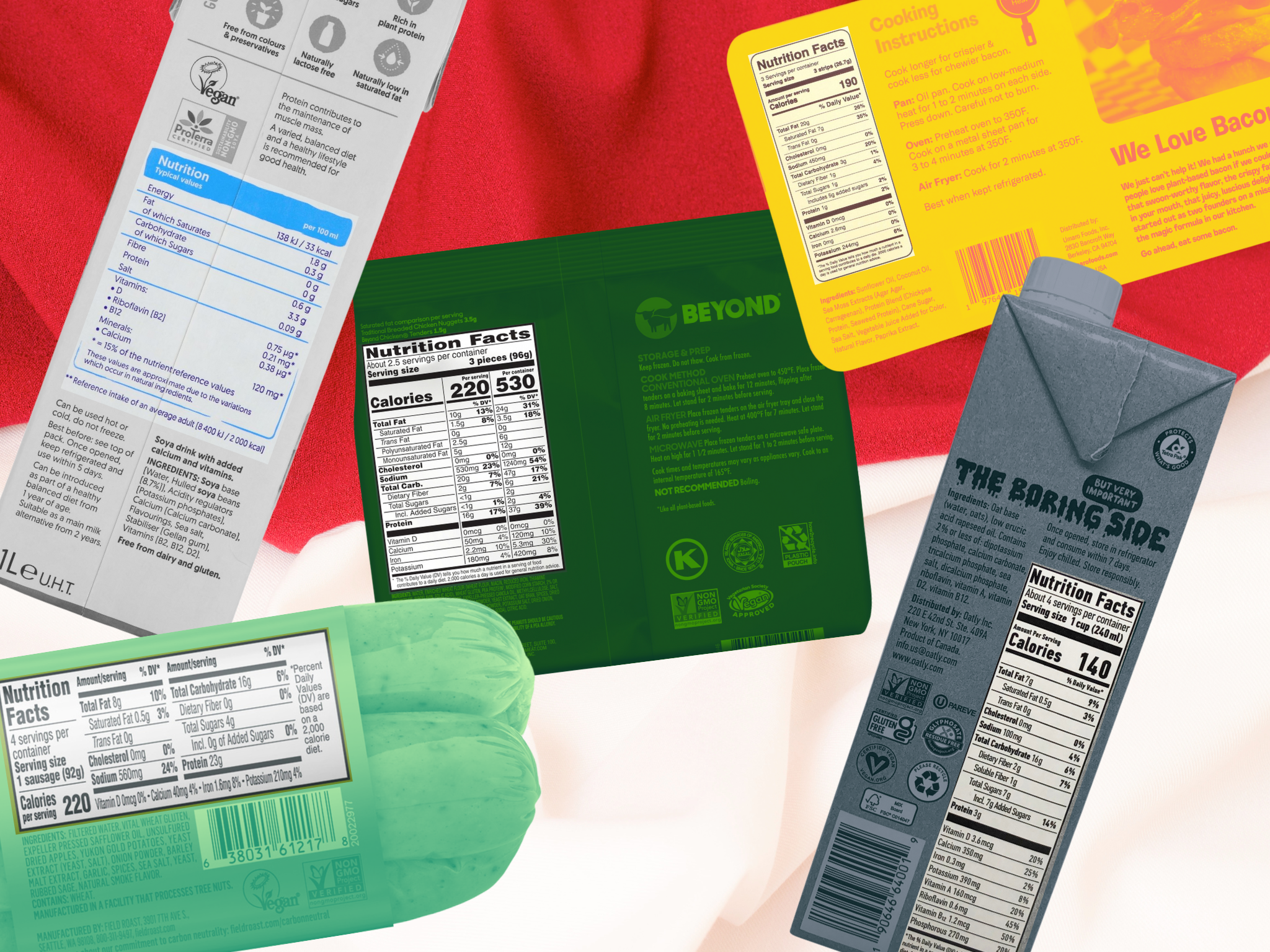
When it comes to health, plant-based analogues to meat and dairy have similar or better nutritional profiles, an 11-country study reveals.
Vegan burgers, sausages and bacon are better for health than conventional meat, while dairy alternatives offer similar nutritional profiles to cow’s milk, according to an analysis of over 670 plant-based products.
Conducted by food awareness organisation ProVeg International, the research evaluated products available in local supermarkets in 11 countries – Belgium, Czechia, Germany, Italy, Malaysia, the Netherlands, Poland, South Africa, Spain, the UK, and the US – and used a scoring system based on internationally recognised nutrition guidelines from the WHO, the Netherlands Nutrition Centre, and the European Food Safety Authority.
“The report really highlights how much potential plant-based alternatives have to bring more diversity to people’s plates and replace vast quantities of animal-based products currently dominating the supermarket shelves,” said co-author Anna-Lena Klapp, who is ProVeg’s head of research.
“Plant-based alternatives can build bridges between people’s current eating habits and a healthy, climate-friendly eating habit. Each stakeholder can play an important role in enabling the establishment of healthy and sustainable diets,” she added.
Plant-based meat nutritionally superior

The report found that the average nutritional quality of all plant-based meat products analysed was slightly better, with a mean score of 5.32 versus 4.50 for animal-derived meat (the maximum score being 8.0).
While the nutritional value varied by country, the average score for vegan products in each nation was still similar to or higher than conventional meat. The Netherlands has the highest score (6.67), with 22 of the 82 products achieving the maximum score. But on the flip side, in Malaysia, a lack of fortification (especially vitamin B12), high salt content, and inadequate protein and fibre levels took the average score down to 4.12.
Vegan burgers and chicken breasts scored similarly to the comparative animal proteins, while plant-based bacon, chicken nuggets, and sausages performed particularly better. Only schnitzels performed worse in almost all countries.
The analysis suggested that plant-based meats have between 11.2 and 19.6 of protein per 100g, compared to 15-19.5g for conventional products. To be classified as a protein source, at least 20% of a product’s calories should come from protein – in each country, more than 60% of vegan offerings fall under this category.
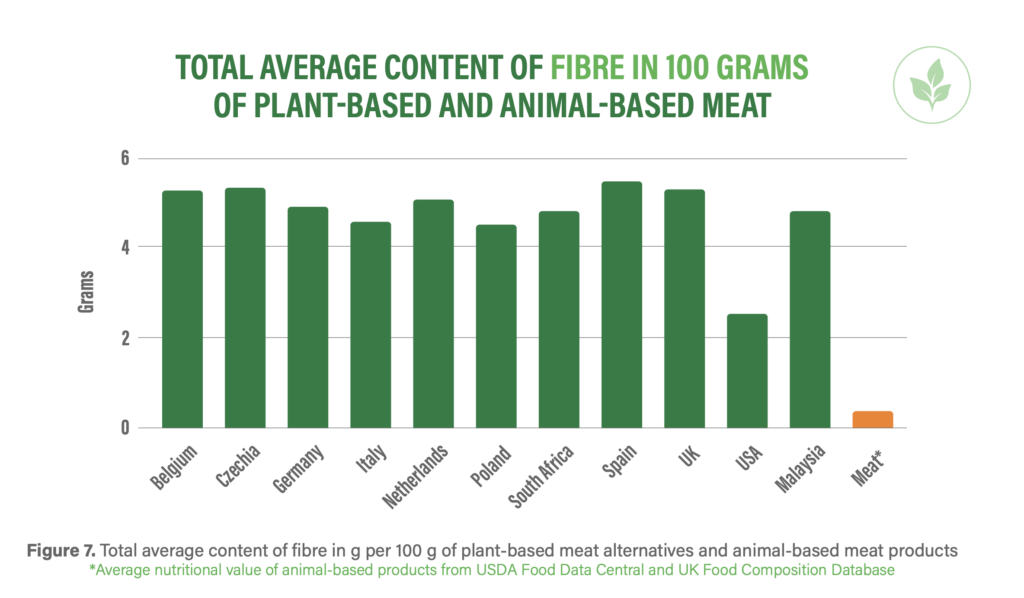
Similarly, in all countries bar the US, over 60% of plant-based meat products had 3g or more of fibre per 100g, the threshold to be considered as a source of fibre. Only 29% of American meat analogues contain as much fibre, but even so, the average content (about 2.5g per 100g) is much higher than conventional meat (less than 0.5g).
Meanwhile, Malaysia’s use of coconut oil as a primary ingredient makes it the only country in the research where meat alternatives have an average saturated fat amount higher than the recommended level of 2.5g.
ProVeg found that depending on the market, plant-based meats are generally fortified with iron and vitamin B12, but fortification still does not appear to be a common practice. “The three main barriers for plant-based manufacturers who wish to fortify their products were identified: regulatory restrictions, consumer acceptance, and technical challenges,” the authors wrote.
But while the sugar content of 98% of the analysed vegan meat products was below the set maximum of 5%, the salt content exceeds the 1.1g per 100g limit in most countries. “Salt can be replaced with spices, herbs, and high-quality ingredients that are tasty in their own right,” the report stated. “Potassium salt (KCl) can also replace some of the added salt without altering the sensory characteristics of the product.”
Milk alternatives on par with dairy

When it comes to non-dairy milk, their average score was 6.5 (out of a maximum of 9.0), higher than the 6.0 achieved by cow’s milk in the UK, but lower than the 7.0 score for dairy in the US (where these products tend to be fortified). In countries like the Netherlands, Italy, Belgium, the UK, and Czechia, though, plant-based milk scored between 7.0 and 7.7.
Cow’s milk also typically has a significantly higher amount of protein on average (3.5%), compared to 1-2% for vegan alternatives (although soy milk’s protein content is much closer to dairy). But, the research points out, milk is not categorised as part of the protein group, but as a source of calcium in most dietary guidelines worldwide. “Therefore, it is not necessarily a disadvantage if some plant milks contain only small amounts of protein as long as they are fortified with calcium.”
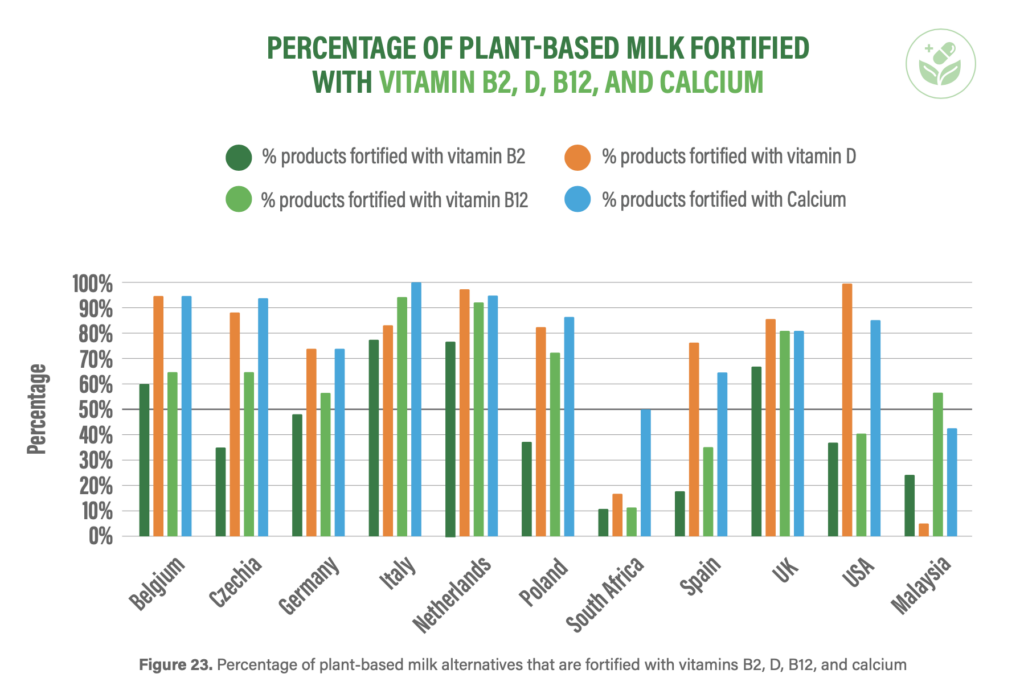
To that end, the most common level of calcium fortification in dairy-free milks is 120mg per 100ml, which is comparable to conventional milk. Plant-based products in all countries also outscore cow’s milk on the average amount of vitamin D. The same goes for vitamin B2, except for the US, where the fortification levels are on par with dairy.
Cow’s milk also contains a much higher level of saturated fat (1.5g per 100ml) than plant-based alternatives (which range from 0.2-0.8g per 100ml). In each country, at least 89% of vegan milk products have less than 1.1g of saturated fat.
Crucially, plant-based milk is often criticised for its sugar content, but the analysis revealed that all the products examined had lower amounts of sugar (2%) than cow’s milk (4.8%). The majority of non-dairy alternatives fall within the maximum level of 2.5g of sugar per 100ml in every country except the UK. But the salt concentration was below the recommended limit in over 90% of products across all 11 nations.
Recommendations for different stakeholders
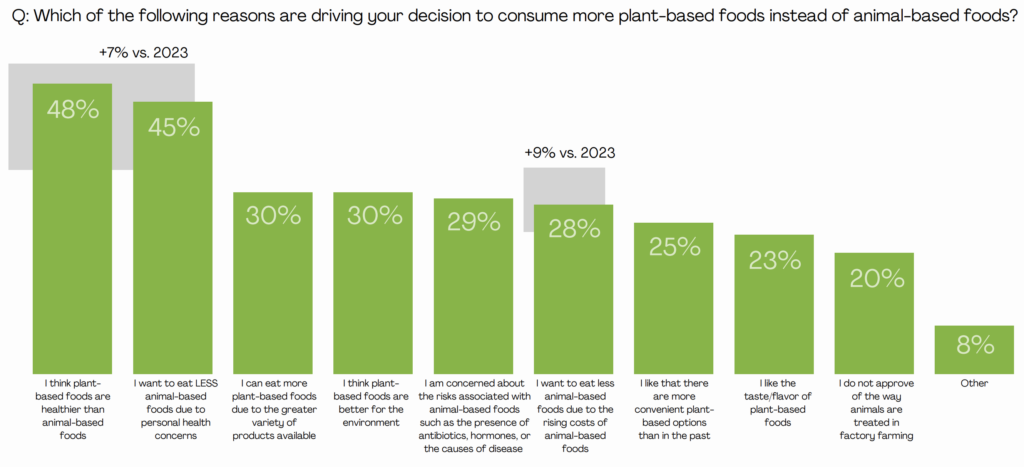
“The report really highlights how much potential plant-based alternatives have to bring more diversity to people’s plates and replace vast quantities of animal-based products currently dominating the supermarket shelves,” report co-author Anna-Lena Klapp, who is the head of research at ProVeg.
“Plant-based alternatives can build bridges between people’s current eating habits and a healthy, climate-friendly eating habit,” she added.
Health has increasingly become the most prominent driver of plant-based food consumption. In the US, 60% of consumers are influenced by this, while 45% are cutting back on meat and dairy because of personal health concerns. Across the Atlantic, too, nearly four in 10 Brits eat plant-based meat for its health benefits. In the EU, too, half of consumers are reducing their annual meat intake, with health being the primary reason (47%).
“It is essential for nations to shift to more plant-based diets as quickly as possible. Our report highlights the current strengths and limitations of plant-based products, allowing stakeholders like industry and Governments to further improve plant-based offerings on offer in their nations’ supermarkets,” said Valentina Gallani, health and nutrition manager at ProVeg and lead author of the study.
The report calls on food producers to formulate healthier plant-based products by fortifying them where feasible and limiting saturated fat, salt and sugar. Providing transparency to consumers is crucial, as are collaborations between startups and conventional meat and dairy companies to develop higher-quality products.
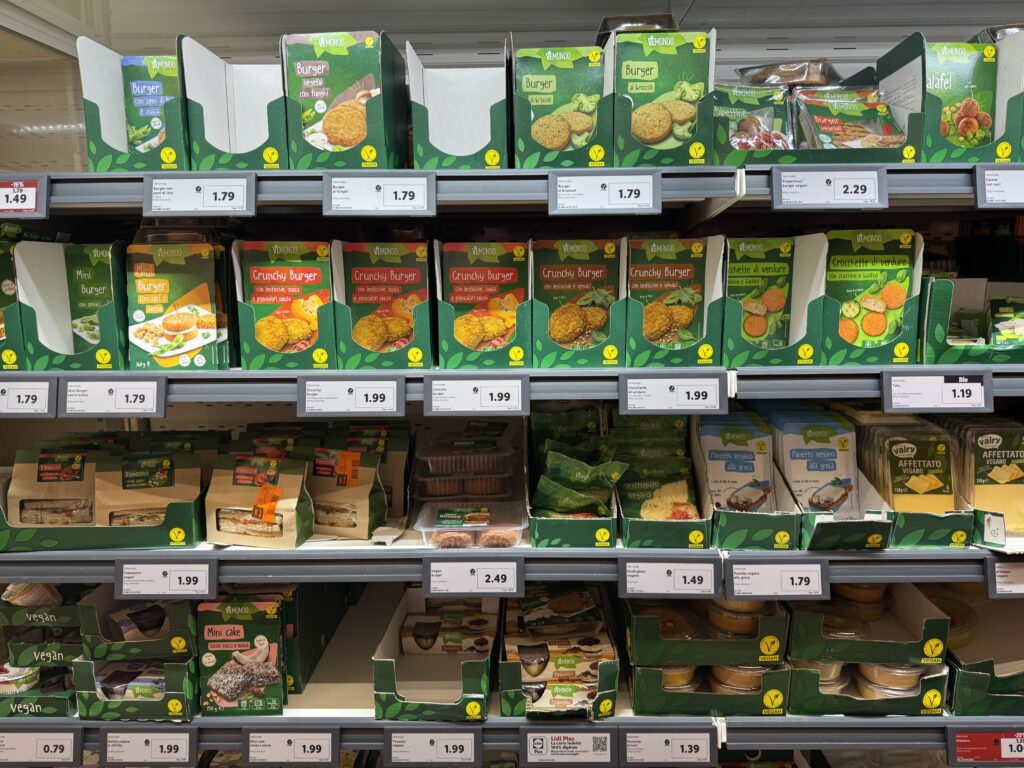
Retailers should increase the visibility of vegan products by placing them in the meat and dairy aisles, ensure price parity, make their promotions more plant-focused, and commit to a protein split ratio of 60% plant-based sales by 2030 (as Lidl has done).
In terms of policy interventions, governments should include vegan alternatives in national dietary guidelines, develop regulations and plans for fortification and salt reformulation, reduce the VAT on plant-based products, and remove restrictions on the use of meat- and dairy-related terms on product labels.
ProVeg suggested that scientists and researchers should investigate the long-term health effects of plant-based meat and dairy, facilitate population-wide dietary shifts, assess the bioavailability of micronutrients and the role of fortification, as well as explore salt reduction techniques.
And for their part, consumers should prioritise a whole-food plant-based diet, reduce animal proteins to lower their climate footprint, recognise both the strengths and limitations of vegan alternatives, choose products with lower added sugars, saturated fat and salt, but not demonise ultra-processed foods.
The post Plant-Based Meat & Dairy On Par or Better for Health Than Animal Protein, Finds Analysis appeared first on Green Queen.
This post was originally published on Green Queen.